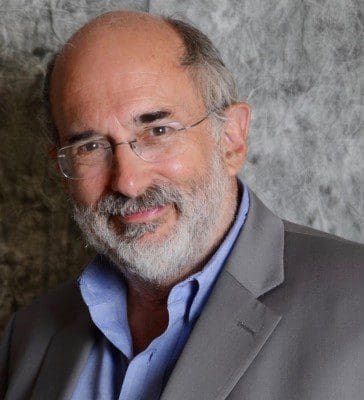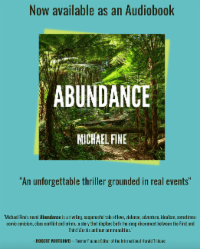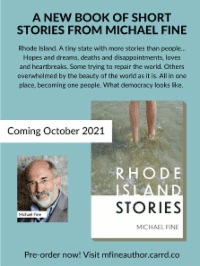Search Posts
Recent Posts
- Providence Delivers Summer Fun: Food, Water Play & Activities June 20, 2025
- Rhode Island Weather for June 20, 2025 – Jack Donnelly June 20, 2025
- Outdoors in RI: Time to Seastreak – Vets Access – Invasive Alerts – Clays 4 Charity at The Preserve – 2A TODAY June 20, 2025
- GriefSPEAK: Kill Switch – Mari Nardolillo Dias June 20, 2025
- Dr. Rosemary Costigan Named President of Community College of Rhode Island June 19, 2025
Categories
Subscribe!
Thanks for subscribing! Please check your email for further instructions.

Big – a short story by Michael Fine
by Michael Fine, contributing writer
© Michael Fine 2021
This is a work of fiction. Names, characters, businesses, places, events, locales, and incidents are either the products of the author’s imagination or used in a fictitious manner. Any resemblance to actual persons, living or dead, or actual events is purely coincidental.
_____
She drove him to South Station anyway. Not understanding him at all. Afraid for him.
“Call if you need anything,” she said.
“I will,” he said.
“It’s okay to get off the train and fly home,” she said.
“I know” he said.
“Or fly to Portland. From anyplace,” she said.
“I know. Thanks. I’ll call you,” he said. And kissed her quickly. She tried to hug him hard but it hurt. He didn’t hug her back.
_
South Station in the spring and summer has incredible light. Those big windows to the south made him think of a steamship terminal, not a train station. People cluster under the schedule sign. The announcements come over the public address system. You think you’ll find ships at their berths in the harbor, not train tracks when your train is called and you go to the gate, he thought. But then there are only trains and empty tracks. The trains are big enough, he thought. They aren’t ships. The tracks aren’t the ocean. But there is still that expanse, that possibility, that hope. Big. Just not quite big enough.
_
He sat in the dining car on the regional train to New York. It was silly to go south and then north again from New York to Albany for the trip west. But that is how the world is now, he thought. No train from Boston to Albany today. Amtrak wanted to put him on a bus to Albany. Seven hours. He was tough, sure, but seven hours on a bus was too damn much for him now. Maybe on the way back.
He sat in the dining car, but he didn’t eat. Didn’t eat any more ever. Couldn’t eat. Didn’t want to. Drink, yes. I’ll probably never really eat again, he thought. Little bits. Now and then. Only enough to sustain life. For now.
The train had stopped in Providence, Westerly, New London, and Old Saybrook, and then ran along the coast. So big, that ocean, he thought. He thought of David, of going to see David run. How was it possible that David was a tall man with long legs and powerful thighs? Where had this David come from? The David he remembered was a child, a tiny boy full of sweetness and love, discovering the world for the first time. How big? David would ask. And his father or mother would hold out their arms, hands outstretched, arms far apart. So big! they’d say. And then David or his sister would climb on their laps and hug their necks, wanting to be held, as if to say, too big. Too much. Too soon. Better close. Better together.
New Haven. Then Bridgeport, Stamford and New York. Two hours in the new Penn Station, in a bright new hall. Big. Marble and stainless steel, the announcements muffled and unintelligible. I don’t even want dollar pizza, he thought. And dozed until his train came.
Groton-on Hudson. Poughkeepsie. Rhinecliff.
The train north along the Hudson was glorious. Bright green mountains next to a broad river. The sun setting under blue clouds. The sweep of bridges and lone boats. Perhaps the most beautiful place on earth, he thought. At least right now.
Albany-Rensselaer. Schenectady. Utica.
She thought he was crazy, going by train. Especially now. With his time limited. With this thing, this diagnosis. She understood why he wanted to go, of course. She wanted to go as well. She’d fly out in five days to join him. To see his son, their son David, perhaps the fastest man on earth, certainly the fastest American on earth, run the 1500 metres in an Olympic trial. And win of course. Win again. To run perhaps the fastest 1500 metre ever. What father would deny himself that? Now or ever. Regardless. David would be on the team. Everyone knew that. A gold. Maybe two. To be there, to be with David at this moment, to see his focus, his determination and then his exhilaration, to hear the roar of the crowd, that was a father’s indescribable and perhaps unearned delight, but it was delight nonetheless. Where had this all come from? The determination? The discipline? The desire itself? Where had the runner’s body come from? This tall man with long sinewy legs that were now as strong as the cables that hold bridges aloft. Not from me, the man thought. I give lectures and attend meetings. I look at computer screens all day. At my best I can climb a ladder and paint a house. But I have nothing of the runner in me, nothing of the champion in my soul.
Then pitch black. Utica. Syracuse. Rochester. Neck pillow. Seat reclined. Footrests up. An Ambien. Something like sleep. He heard the middle of the night stations called from far away. Buffalo. Erie. Cleveland. (Mistake on the lake, he remembered, coming in and out, dreaming. The blast furnace of Republic Steel, the flames of Hades and the molten steel that flared orange in a black building in The Flats, seen from the Near West Side, once, forty years ago, a lifetime away.)
Elyria. Sandusky. Then dawn on the lake. Toledo. Bryan. (Bryan? Who ever heard of Bryan, Ohio?) Cornfields and factories on one side. Lake Erie on the other. Little towns and little white churches. Warehouses. Grey skies. But the earth, endless and forgiving, not much more than what it was but nothing less.
Then Waterloo Indiana. Elkhart and South Bend Indiana.
_
Then Chicago itself. Oz, that gleaming city, towering over the lake. Looking like a city ready to topple over into the lake if anyone pushed it.
Five hours to kill in Chicago. The thing gnawing. A liter of Gatorade. An Oxycontin. And sleep curled on a bench.
He was a white man so they didn’t roust him. Maybe people could tell and just let him be. The yellow skin. The gaunt look.
His money and card were in a pouch under his clothes. He used his knapsack as his pillow. There was nothing worth stealing. Freedom’s just another word for nothing left to lose. Me and Bobby McGee.
_
Glenview. Milwaukee, Wisconsin, famous for beer, once. Maybe not now. Columbus aka Madison. He could have called Catrina as he blew through, just to stay hello, but what was he going to say? There had been enough heartache in Catrina’s life already. She didn’t need this from an old boyfriend. Friend, really. Never more. Should have been but wasn’t. Can’t cry over spilt milk. A spilt life. No. Not spilt. Lived.
Portage, Wisconsin. Wisconsin Dells. Tomah. La Cross.
Sun setting. Winona, Minnesota. Red Wing. Who ever heard of these places? Who lives there now, really? Dark. Minneapolis-St. Paul. Something akin to civilization. Then seat reclined. Neck pillow. Footrests up. An Ambien and again something like sleep. The stations in the middle of the night vague amidst confusing dreams of a ship pulling away from shore: St. Cloud. Staples. Detroit Lakes. Fargo, North Dakota. North Dakota! Impossible but real. Grand Forks, Devil’s Lake. Rugby.
And then dawn. How he wished he had light to see the great plains and the badlands. The oil derricks, the fracking camps and reservations. The North Dakota of his dreams.
Then the great plains in luminescent morning light, the land stretching out as if it were a vast ocean, endless and undulating, the grey-green wheat and the tan prairie grasses a shining sea of their own, the sky big. That big. So big.
Minot. Bridges over rivers. Endless forests.
Stanley. Williston. Wolf Point, Montana. Montana! Glasgow. Malta. Havre and then mountains, white ghosts under a blue sky far out on the horizon on the left side of the train. Then towering and so overwhelming. Mountains, God’s feet on the earth, thunderous, wise, immaculate, and big, so big, after all.
Shelby. The train slowing as it climbed. Straining, thinking it can. Through the tunnels, long drink of darkness, couldn’t be made by man, but made by man none the less.
Cut Bank. Browning. East Glacier Park, the sun setting over the white topped Rockies, over mountains bigger than the sky. Essex. West Glacier. Whitefish. Dark again, that ache of missing even one moment of the earth, that longing for the sky. Libby, Montana. Sandpoint, Idaho. And Spokane Washington, where they divide the train. And then sleep again into Portland, just in time for lunch.
_
He made it, that stupid pigheaded son of a bitch. He made it all the way from Keene, New Hampshire to Portland, Oregon on the train and he made it back home by train again.
I won the first heat. Blew them away. Record still stands. Then blew out my Achilles tendon in the qualifier. So it goes.
But he was here. Then he went home and died.
It’s so big, this thing called love, this emotion. Who cares about a damn race? He was one tough son of a bitch.
I loved him and he loved me.
Nothing else matters.
_____

Michael Fine, MD, is a writer, community organizer, and family physician. He is the chief health strategist for the City of Central Falls, RI, and a former Director of the Rhode Island Department of Health, 2011–2015. He is currently the Board Vice Chair and Co-Founder of the Scituate Health Alliance. He is the recipient of the Barbara Starfield Award, the John Cunningham Award, and the Austin T. Levy Award.
He has served as Health Policy Advisor to Mayor James Diossa of Central Falls, Rhode Island and Senior Population Health and Clinical Services Officer at Blackstone Valley Health Care, Inc. He facilitated a partnership between the City and Blackstone to create the Central Falls Neighborhood Health Station, the US first attempt to build a population based primary care and public health collaboration that serves the entire population of a place.
He was named Health Liaison to the City of Pawtucket. Dr. Fine served in the Cabinet of Governor Lincoln Chafee as Director of the Rhode Island Department of Health from February of 2011 until March of 2015, overseeing a broad range of public health programs and services, overseeing 450 public health professionals and managing a budget of $110 million a year.
Dr. Fine’s career as both a family physician and manager in the field of healthcare has been devoted to healthcare reform and the care of under-served populations. Before his confirmation as Director of Health, Dr. Fine was the Medical Program Director at the Rhode Island Department of Corrections, overseeing a healthcare unit servicing nearly 20,000 people a year, with a staff of over 85 physicians, psychiatrists, mental health workers, nurses, and other health professionals.
He was a founder and Managing Director of HealthAccessRI, the nation’s first statewide organization making prepaid, reduced fee-for-service primary care available to people without employer-provided health insurance. Dr. Fine practiced for 16 years in urban Pawtucket, Rhode Island and rural Scituate, Rhode Island. He is the former Physician Operating Officer of Hillside Avenue Family and Community Medicine, the largest family practice in Rhode Island, and the former Physician-in-Chief of the Rhode Island and Miriam Hospitals’ Departments of Family and Community Medicine. He was co-chair of the Allied Advocacy Group for Integrated Primary Care.
He convened and facilitated the Primary Care Leadership Council, a statewide organization that represented 75 percent of Rhode Island’s primary care physicians and practices. He currently serves on the Boards of Crossroads Rhode Island, the state’s largest service organization for the homeless, the Lown Institute, the George Wiley Center, and RICARES. Dr. Fine founded the Scituate Health Alliance, a community-based, population-focused non-profit organization, which made Scituate the first community in the United States to provide primary medical and dental care to all town residents.
Dr. Fine is a past President of the Rhode Island Academy of Family Physicians and was an Open Society Institute/George Soros Fellow in Medicine as a Profession from 2000 to2002. He has served on a number of legislative committees for the Rhode Island General Assembly, has chaired the Primary Care Advisory Committee for the Rhode Island Department of Health, and sat on both the Urban Family Medicine Task Force of the American Academy of Family Physicians and the National Advisory Council to the National Health Services Corps.
Read more short stories by Dr. Michael Fine for RINewsToday, here: https://rinewstoday.com/dr-michael-fine/


